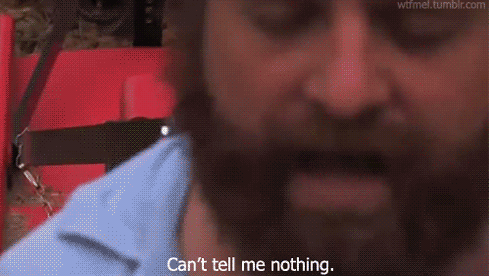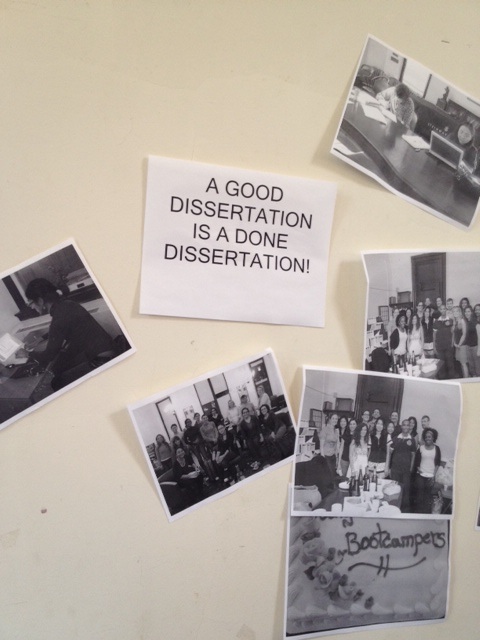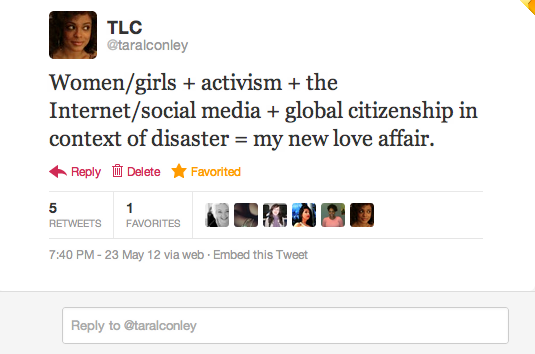My NCA Statement on Feminism and Communications
Due to lack of travel funds I am unable to attend NCA (National Communication Association) Conference 2012 this year. Below is my official statement that will be presented on my behalf during Saturday morning’s roundtable session entitled “Critical Perspectives on Feminism and Activism in the Third Wave”. I’ve spent the last few years grappling with feminist identity. Despite over the years having performed so-called “feminist duties” as an academic and as a political activist, (i.e. earning a MA in Women’s Studies, caucusing for Hillary Clinton in 2008, and volunteering as a hotline operator for a women’s shelter), I realize that my feminism has less to do with declaring a feminist identity and more to do with how my feminism emerges through work and scholarship, both of which almost always reflect a feminist ethic grounded in an inquiry stance. That is, I’m always questioning my-self in relation to Other; always replaying Trinh T. Minh-ha’s mystifying question in my head, “If you can’t locate the other, how are you to locate your-self?”
I worry, however, that feminism as a discipline, as a politic, as a form of activism, and as an idea(l) has become institutionalized within a western moral, ethic, and capitalistic framework that looks more and more like hierarchy, chronology, and characterized by waves (eg. generations). I also wonder about feminism as a capital enterprise. The notion of “professional feminism” troubles me. I realize folks have to make a living off of their work, but the label “professional feminist” conjures up awkward emotions. And no, I’m not referring to the welcomed contradictions of personhood that Gloria Anzaldúa brilliantly theorizes in Borderlands La Frontera, but rather I’m talking about the idea of professional feminism that exist in conflict with how I understand feminist consciousness; that is, something as sacred. Something that cannot be bought or sold. Untouched.
That said, however, I’m happy to see and feel feminist ideas spread throughout our home lives, our governments, our schools, and disseminated by way communication technologies.
To see feminist activism travel throughout time and space has been incredible to witness. With technology we are able recognize the multivalent nature of our potential of doing feminism, and by extension being feminist. Feminists have been able to spread our advocacy projects across time and space, and organize our bodies to protests in cities and neighborhoods across the globe. We have brought together domestic and international partners as we strive for justice and relief. We have called out others and at times we have had to confront ourselves. We have moved our advocacy beyond stationary online and offline spaces.
As we move throughout these spaces and places, I hope we can approach third space consciousness where we fight as much for the preservation of our selves as we fight for the preservation of others. This movement toward consciousness—born of techno advocacy practices that span across computer mediated and non-computer mediated contexts, is a threshold space of place where we can (I hope!) see ourselves through the eyes of others and by way of panoramic views.
This kind of feminism spreads like sun rays and warms me up everytime I think about it.
Feminist theory and ethnography is peppered throughout the discipline of communications. I know of researchers at my institution who look towards feminist theory and ethnography to inform their work in communications and education, and of course, I have peers who see no use for feminist theory and ethnography. In fact, they may have never heard of feminist theory and feminist ethnography throughout their academic careers. The beauty of academia and research is that we can take multiple approaches to understanding the worlds around us. As a researcher and scholar of both education and communications, I carry with me an understanding of feminist theories and methodologies that I apply to my research on media, Internet/web 2.0, and youth culture. Feminist theory and ethnography are just a few of my lenses, and I don’t expect anyone else to wear them as I do when approaching research. I do, however, expect that the discipline of communications will continue to embrace interdisciplinary approaches. I expect communication scholars to acknowledge and embrace transdisciplinary analyses informed by theoretical approaches that take into account experiences and storytelling at the intersection of gender, class, sex, sexuality, ‘race’, dis/ability, religion, tribe, and ecology.
I passed.
The letter arrived in the mail today around 4pm EST. When I saw the return address from my department, I knew. Before I could even open the letter, it fell from my hands and onto the lobby floor of my apartment building. Nerves. For the past four months, I had an inkling that I passed my doctoral certification exam, but one's never quite sure when it comes to these things; that is, the intellectual validation from your senior level peers.

I still have two more steps to accomplish before I advance to full candidacy; the Certification Study (or "pilot study") and Literature Review. Here's to knocking 'em down like bowling pins on the last frame.
Now that I've passed this step, I have a bucket load of confidence going into my own research. I happy. I'm relieved. And, well you basically . . .
Cause . . .
That's right, I said . . .
I'll be poppin' that doctoral student swag until further notice.
On to the next...
#Dissertation
"Consciousness of exclusion through naming is acute"
Consciousness of exclusion through naming is acute. Identities seem contradictory, partial, and strategic. With the hard-won recognition of their social and historical constitution, gender, race, and class cannot provide the basis for belief in ‘essential’ unity. There is nothing about being ‘female’ that naturally binds women. There is not even such a state as ‘being’ female, itself a highly complex category constructed in contested sexual scientific discourses and other social practices. Gender, race, or class-consciousness is an achievement forced on us by the terrible historical experience of the contradictory social realities of patriarchy, colonialism, and capitalism.
~ Donna Haraway, "A Cyborg Manifesto"
Photo source
Why I'm obsessed with falling into a wormhole
"I still want to fall in a wormhole." - Me
[vimeo 19870165 w=500 h=281]
Thanks for being curious, dad.
To pick or not to pick . . . a dissertation topic?
I'm terribly indecisive. Being an academic and frequent customer at Subway tends to reveal my indecisive nature all too well. Picking the right dissertation topic is as nerve-racking as picking the right meat to go on my sandwich (and let's not even talk about how long it takes for me to pick the perfect cheese). It takes me forever to choose. Whether it be choosing the right angle for an article, or choosing the perfect come back during an argument, I simply cannot escape momentary stagnation. Eventually things do get accomplished. Sandwiches get made. Papers get written. That said, however, with the third year of doctoral studies looming, I realize that I have to embrace decisiveness so I can move forward with my work and the rest of my life. My goal this summer is to work on, maybe even complete, a literature review for a dissertation topic.
[Awkward pause]
No, seriously. This is my goal.
It's not that I don't know what to write about when it comes to a dissertation topic, it's that I have too many ideas to focus on. One day I want to conduct a cross-cultural study on civic engagement using digital video, and the next day I want to write an in-depth analysis on networked technology and identity (re)making. Not to mention that I still could write an entire dissertation on the relationship between Donna Haraway's cyborg theory and Gloria Anzaldua's idea of mestiza consciousness, but in the context of networked technology. Nonetheless, the time has come for me to zero-in on a topic that is narrow enough for me to tackle in a full-fledged dissertation. If I fail to identify and narrow my focus, then I fear that I may end up being a doctoral student for the next 10 years of my life. #HellToTheNoooooooooo
My plight is nothing new, however. For ages, doctoral students have grappled with wanting to find the perfect dissertation topic that is all at once relevant, accessible, and engaging. My friend Allison summed up this desire quite nicely on her Facebook status update:
is obsessing about a dissertation topic. needs to be so many things (timely, accessible, creative, transdisciplinary, useful... to name a few) and not take forever!
To which I replied:
Join. the. club.
To which she then gave me one of these:
Facebook is awesome.
I know I'm not alone when it comes to obsessing over the right research topic that will keep me engaged for at least 2 years. I genuinely want the work to be right however long it takes. That said, I always come back to this image I snapped while at a technology and 'race' conference at Columbia University last fall:
#That.
I may have come across something that could steer me in the right direction. Yesterday, I found an article on Jezebel that discusses female cyberactivists during the Arab Spring conflict (you'll notice that I'm the only person who commented on the article. That's me, "Friday025"). A few years ago I wrote about a similar topic but I discussed virtual volunteers and women's resolved during hurricane Katrina. I'm still in the process of reading Radsch's entire research, but upon coming across the topic of this study, something familiar within me was ignited. I think they call it a spark. All along I've been passionate about all of the things that I've already been passionate about, but I just haven't been able to make the connections--until now. I tweeted my response to the article and indicated some of these connections in less than 140 characters.
With that, I do believe things are coming together. In fact, I am further along with identifying and narrowing down my ideas than I was at the beginning of the year. I just have to remember what a friend of mine who is in my program recently told me (paraphrased), "Think back to why you wanted to be here in the first place. That's where you'll find your topic."
Here's to thinking backwards to find the right topic.







